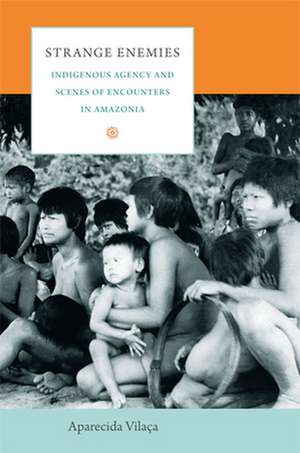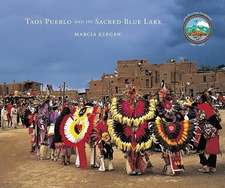Strange Enemies – Indigenous Agency and Scenes of Encounters in Amazonia: The Cultures and Practice of Violence
Autor Aparecida Vilaça, David Rodgersen Limba Engleză Paperback – 18 mai 2010
Preț: 304.10 lei
Nou
Puncte Express: 456
Preț estimativ în valută:
58.19€ • 60.75$ • 48.16£
58.19€ • 60.75$ • 48.16£
Carte tipărită la comandă
Livrare economică 05-19 aprilie
Preluare comenzi: 021 569.72.76
Specificații
ISBN-13: 9780822345732
ISBN-10: 0822345730
Pagini: 392
Ilustrații: 41 illustrations
Dimensiuni: 163 x 233 x 24 mm
Greutate: 0.57 kg
Editura: MD – Duke University Press
Seria The Cultures and Practice of Violence
ISBN-10: 0822345730
Pagini: 392
Ilustrații: 41 illustrations
Dimensiuni: 163 x 233 x 24 mm
Greutate: 0.57 kg
Editura: MD – Duke University Press
Seria The Cultures and Practice of Violence
Recenzii
"It is based upon an intimate and extensive knowledge of their culture and fundamental notions and proposes an explanation of how and why these contingent events unfolded in the last hundred years the way they did. As is evident from this enumeration, the depth of the ethnography iscombined with an analysis firmly based upon the current state of Amazonian ethnology. The book is a well-written, highly readable, profound and original ethnographic and analytic contribution to Amazonian ethnology and first encounter literature, such that any divergence in interpretation will also need an extended argument: it should be read by everyone interested in the subject." Edwin Reesink, European Review of Latin American and Caribbean Studies
"Thanks to the excellent anthropological work of Aparecida Vilaça and colleagues studying Amazonia and Melanesia, it becomes increasingly apparent that the incorporation of otherness--in practices ranging from marriage and shamanism to warfare and cannibalism--is an essential condition of human being. It follows that the relationship between societies is an essential condition of their respective cultural orders as well as their historical development. Now Vilaça has produced a landmark ethnography of these processes, with an unparalleled documentation from the inside of the assimilation of the outside, highlighted by a stunning analysis of the cultural reciprocities of the colonial encounter.--Marshall Sahlins, author of The Western Illusion of Human Nature
"This intimate portrait of a remarkable people who insist on encountering modernity on their own terms challenges us to think beyond outmoded notions about acculturation and loss of tradition. Deftly weaving the insights of Amazonian perspectivism with history, myth, and personal experience, Aparecida Vilaça shows how Wari choices to live with whites and adopt many of their ways are part of the logic of being indigenous. Empowerment derives from seeing the world through the eyes of others. Strange Enemies invites us to see the world through Wari eyes. The view is fascinating.--Beth A. Conklin, author of Consuming Grief: Compassionate Cannibalism in an Amazonian Society
"It is based upon an intimate and extensive knowledge of their culture and fundamental notions and proposes an explanation of how and why these contingent events unfolded in the last hundred years the way they did. As is evident from this enumeration, the depth of the ethnography is combined with an analysis firmly based upon the current state of Amazonian ethnology. The book is a well-written, highly readable, profound and original ethnographic and analytic contribution to Amazonian ethnology and 'first encounter' literature, such that any divergence in interpretation will also need an extended argument: it should be read by everyone interested in the subject." Edwin Reesink, European Review of Latin American and Caribbean Studies "Thanks to the excellent anthropological work of Aparecida Vilaca and colleagues studying Amazonia and Melanesia, it becomes increasingly apparent that the incorporation of otherness--in practices ranging from marriage and shamanism to warfare and cannibalism--is an essential condition of human being. It follows that the relationship between societies is an essential condition of their respective cultural orders as well as their historical development. Now Vilaca has produced a landmark ethnography of these processes, with an unparalleled documentation from the inside of the assimilation of the outside, highlighted by a stunning analysis of the cultural reciprocities of the colonial encounter."--Marshall Sahlins, author of The Western Illusion of Human Nature "This intimate portrait of a remarkable people who insist on encountering modernity on their own terms challenges us to think beyond outmoded notions about acculturation and loss of tradition. Deftly weaving the insights of Amazonian perspectivism with history, myth, and personal experience, Aparecida Vilaca shows how Wari' choices to live with whites and adopt many of their ways are part of the logic of being indigenous. Empowerment derives from seeing the world through the eyes of others. Strange Enemies invites us to see the world through Wari' eyes. The view is fascinating."--Beth A. Conklin, author of Consuming Grief: Compassionate Cannibalism in an Amazonian Society
"Thanks to the excellent anthropological work of Aparecida Vilaça and colleagues studying Amazonia and Melanesia, it becomes increasingly apparent that the incorporation of otherness--in practices ranging from marriage and shamanism to warfare and cannibalism--is an essential condition of human being. It follows that the relationship between societies is an essential condition of their respective cultural orders as well as their historical development. Now Vilaça has produced a landmark ethnography of these processes, with an unparalleled documentation from the inside of the assimilation of the outside, highlighted by a stunning analysis of the cultural reciprocities of the colonial encounter.--Marshall Sahlins, author of The Western Illusion of Human Nature
"This intimate portrait of a remarkable people who insist on encountering modernity on their own terms challenges us to think beyond outmoded notions about acculturation and loss of tradition. Deftly weaving the insights of Amazonian perspectivism with history, myth, and personal experience, Aparecida Vilaça shows how Wari choices to live with whites and adopt many of their ways are part of the logic of being indigenous. Empowerment derives from seeing the world through the eyes of others. Strange Enemies invites us to see the world through Wari eyes. The view is fascinating.--Beth A. Conklin, author of Consuming Grief: Compassionate Cannibalism in an Amazonian Society
"It is based upon an intimate and extensive knowledge of their culture and fundamental notions and proposes an explanation of how and why these contingent events unfolded in the last hundred years the way they did. As is evident from this enumeration, the depth of the ethnography is combined with an analysis firmly based upon the current state of Amazonian ethnology. The book is a well-written, highly readable, profound and original ethnographic and analytic contribution to Amazonian ethnology and 'first encounter' literature, such that any divergence in interpretation will also need an extended argument: it should be read by everyone interested in the subject." Edwin Reesink, European Review of Latin American and Caribbean Studies "Thanks to the excellent anthropological work of Aparecida Vilaca and colleagues studying Amazonia and Melanesia, it becomes increasingly apparent that the incorporation of otherness--in practices ranging from marriage and shamanism to warfare and cannibalism--is an essential condition of human being. It follows that the relationship between societies is an essential condition of their respective cultural orders as well as their historical development. Now Vilaca has produced a landmark ethnography of these processes, with an unparalleled documentation from the inside of the assimilation of the outside, highlighted by a stunning analysis of the cultural reciprocities of the colonial encounter."--Marshall Sahlins, author of The Western Illusion of Human Nature "This intimate portrait of a remarkable people who insist on encountering modernity on their own terms challenges us to think beyond outmoded notions about acculturation and loss of tradition. Deftly weaving the insights of Amazonian perspectivism with history, myth, and personal experience, Aparecida Vilaca shows how Wari' choices to live with whites and adopt many of their ways are part of the logic of being indigenous. Empowerment derives from seeing the world through the eyes of others. Strange Enemies invites us to see the world through Wari' eyes. The view is fascinating."--Beth A. Conklin, author of Consuming Grief: Compassionate Cannibalism in an Amazonian Society
Notă biografică
Textul de pe ultima copertă
"This intimate portrait of a remarkable people who insist on encountering modernity on their own terms challenges us to think beyond outmoded notions about acculturation and loss of tradition. Deftly weaving the insights of Amazonian perspectivism with history, myth, and personal experience, Aparecida Vilaca shows how Wari' choices to live with whites and adopt many of their ways are part of the logic of being indigenous. Empowerment derives from seeing the world through the eyes of others. "Strange Enemies" invites us to see the world through Wari' eyes. The view is fascinating."--Beth A. Conklin, author of "Consuming Grief: Compassionate Cannibalism in an Amazonian Society"
Cuprins
Descriere
This ethnography--translated from the Portuguese-- describes the first encounters between the Wari' Indians and whites, and is the only monographic study to date about the process of contacting a previously isolated indigenous group in the South American

























